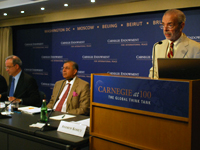Registration
You will receive an email confirming your registration.
Ten years after the September 11 attacks and the start of the war in Afghanistan, it is important to consider how the relationship between Western and Muslim publics has evolved, and what this means for policymakers. A panel of experts discussed a new Pew Research Center report on how Western and Muslim publics perceive each other, based on a survey conducted this spring by the Pew Global Attitudes Project. Pew’s Andrew Kohut presented the new findings, followed by a discussion with Georgetown University’s Samer Shehata and the Atlantic Council’s Shuja Nawaz. Carnegie’s Marwan Muasher moderated.
Main Findings
Kohut presented the main findings of the Pew study:
- Changing Attitudes: Kohut explained that a similar study had been conducted in 2006. Over the past five years, there has been a modest thaw in attitudes in Europe and West toward Muslims. However, he said, in the Muslim world there has been no change in views of the West.
- Perceptions of the West: Muslims surveyed expressed more unfavorable opinions about Westerners than Americans or Europeans did about Muslims, Kohut said. Muslims in the Middle East and South Asia were the most unfavorable to the West, while Muslim minorities in Africa were the most favorable.
- Islamic Extremism: The majority of both Muslims and Westerners who were surveyed expressed a fear of Islamic extremism.
- Perceptions of Violence: The majority of Muslims and Westerners identified the other group as violent, but Kohut said that Westerners were less likely to say this than vice versa.
- Religious Divides: There was a wide divergence among Muslim respondents regarding their views of Christians. For example, Kohut related that 96 percent of Lebanese Muslims expressed a positive view of Christians, compared to just 48 percent of Egyptian Muslims.
- September 11: Kohut stated that there is a widespread belief in the Muslim world that the September 11 attacks were not perpetrated by Arabs. Less than 30 percent of all Muslim survey respondents in all seven Muslim countries surveyed accepted the idea that Arabs carried out the attacks on the World Trade Center and Pentagon.
Reasons for Tensions
Nawaz discussed the some of the key factors that have led to tension between the West and the Muslim world:
- Education: Western education has neglected to instill an understanding of international affairs, geography, and history, creating a society ill-equipped not only to understand but to deal with people who live in the Muslim world.
- Personal Contact: The majority of Muslim populations have never had contact with Americans or the West. Their view of the West comes mostly through local media. By placing barriers to immigration and international travel, the United States and Europe have made personal interaction even more difficult.
Policy Implications
- A Shared Concern: According to Nawaz, the fact that both Muslims and Westerners oppose Islamic extremism can be used as leverage by policymakers to enhance relations between the two regions.
- Troop Withdrawal: Shehata suggested that the withdrawal of U.S. troops from Iraq and Afghanistan in the next decade should decrease Muslim negativity toward the West.
- Palestine: The “primary lens” through which Muslims view the United States remains the Palestinian issue, Shehata added.
- Support for Dictators: Nawaz argued that U.S. support of autocratic rulers, whether in Pakistan or the Middle East, has contributed largely to the popular sentiment against the West.
Effect of the Arab Spring
- Changing Western Perceptions: Muasher suggested it is possible that the recent popular Arab uprisings had “humanized” Arabs in the eyes of the West, which could contribute to more positive views among Westerners of the Muslim world.
- Domestic Interests: The Arab Spring will likely decrease hostility to the West in the coming years, as domestic efforts to reform governance and leadership in the Arab world become more prominent, Nawaz added.
- Libya: Shehata said that it was significant that there had not been one major public demonstration in the Arab world against NATO’s bombing of Libya despite it being a military operation that the west was performing in a predominately Muslim country.
